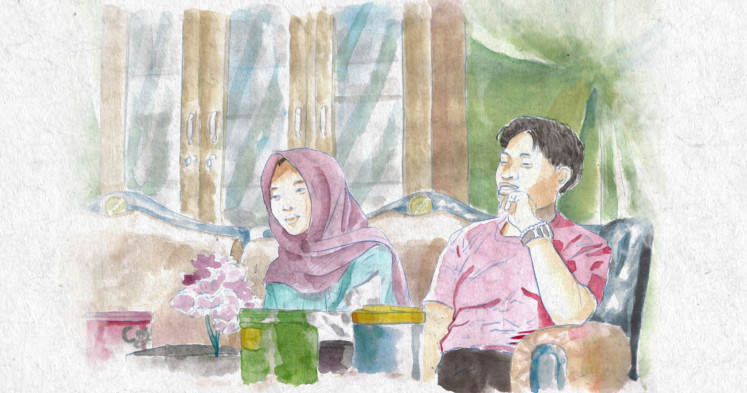
[ad_1]
In a collectivist culture like Indonesia’s, one of the ways that a patriarchal society polices women’s rights over their own bodies is by pressuring them to have children, no matter whether the women want to have children or not.
Their personal experiences dealing with social pressures and judgments from their nosy neighbors inspired husband-wife filmmakers Chonie Prysilia and Hizkia Subiyantoro to create a feature-length animated documentary called K0s0ng (empty), released under the English title No One Inside.
The filmmaking couple, currently living in Yogyakarta, deliberately decided not to have children.
“I was called ‘gabug’ by a neighbor. I didn’t speak Javanese, so I asked my husband what that meant. Literally, the word refers to [an empty rice husk], but metaphorically, it refers to infertile women,” Chonie told The Jakarta Post during an interview on Sept. 11.
Chonie was not the only one “punished” by their community for not having children, but also her husband, Hizkia.
“My neighbors started to bully me, saying that I was not man enough to have children,” Hizkia told the Post, highlighting the toxic masculinity of the insult.
“I felt offended and started to get angry, but I didn’t want to be angry all the time. So in 2016, my wife and I decided to answer their questions and hurtful remarks with this film instead,” he said.
Chonie said that as she started speaking with women she knew who had chosen not to have children, she began to understand that she and her husband were merely a tiny part of a much bigger issue. She said that this marked a turning point in that the couple’s struggles with their neighbors started to feel less personal.
And the five women she spoke to eventually become the protagonist narrators of K0s0ng.
The 77-minute documentary tells the real-life stories of five women of different generations, religious faiths and occupations in different locations across Java.
The women are bound by their common experience of being judged by their communities for not having biological children, whether because of personal choice or unforeseen circumstances. The filmmakers then linked their stories into a single story arc.
“We used animation not only to protect our informants’ privacy, we also used it to visualize their memories, because there’s no way for us to film their memories of the past. We also found it impossible to record their family gatherings, for instance,” said Chonie.
 Visualizing memory: The animated documentary ‘K0s0ng’ uses a variety of animation techniques to protect the privacy of its protagonist narrators as well as to reimagine past events, such as the private moment pictured in this scene. (Courtesy of Hizart Studio/-)
Visualizing memory: The animated documentary ‘K0s0ng’ uses a variety of animation techniques to protect the privacy of its protagonist narrators as well as to reimagine past events, such as the private moment pictured in this scene. (Courtesy of Hizart Studio/-)
The filmmakers employed a variety of animation techniques to weave together the five women’s first-person narration, including traditional cutouts borrowed from the Indonesian wayang (shadow puppet), as well as motion graphics and paint-on-glass.
In a statement, the filmmakers said it was the women’s narration and narratives that dictated the corresponding visual technique.
“We use our visuals also to convey their emotional expressions as captured in our interviews with them,” Chonie explained in the statement.
The filmmakers also used text overlays to emphasize statements that highlight social stigmatization of childless women, which was perpetuated to the present day.
Through its narration and beautiful visuals, K0s0ng is poignant in presenting the many ways in which patriarchy has stripped women of their rights to reproductive freedom by constantly pressuring them to have children.
From members of their extended families to religious leaders, from their neighbors and other members of their communities to colleagues, everyone seems to feel entitled to tell these women what to do with their bodies, and by extension, their lives.
They do this through gossip, mocking them in public and constantly comparing them to other women who have children, whether among their relatives or their residential or professional communities. They also constantly give them unsolicited advice on how to conceive successfully.
The irrationality of patriarchal society’s obsession with women bearing children is also portrayed in the “remedies” they believe could help a couple conceive, ranging from massaging a woman’s stomach to temporarily adopting a child and to “stimulating” a woman’s uterus.
https://www.youtube.com/watch?v=VjnTNQT3Kqw
The protagonist narrators of the documentary are also astute in their observation of people’s obsession with having their own flesh-and-blood progeny, despite the millions of orphans out there dreaming of adoption: that this very idea contains a narcissistic streak that we simply want to have little miniature versions of ourselves.
This human narcissism is visualized as fantasies of people seeing their children growing up to become successful or to take care of them in their old age.
Patriarchal society of course demands that couples primarily bear sons. This is not explicitly addressed in the narration, but the accompanying visuals imply it. Boys are more frequently depicted in the film as opposed to girls, which seems to illustrate this subliminal underpinning of patriarchal and patrilineal cultures to have sons to carry their fathers’ torches.
Animation works well in delivering the emotional weight of the highly personal and divisive issues the documentary exposes. The film concludes with a powerful protest song written and performed by Erlina Rakhmawati for Nada Bicara. The Yogyakarta band has also produced a tie-in mini album for the documentary, available for free on Nada Bicara’s Spotify account.
“Many women emailed me after the screening, telling me their personal stories,” said Chonie. “Many men also told us that the film had opened their horizons on the subject.” (ste)
Your premium period will expire in 0 day(s)
close x

Subscribe to get unlimited access Get 50% off now
[ad_2]
Source link